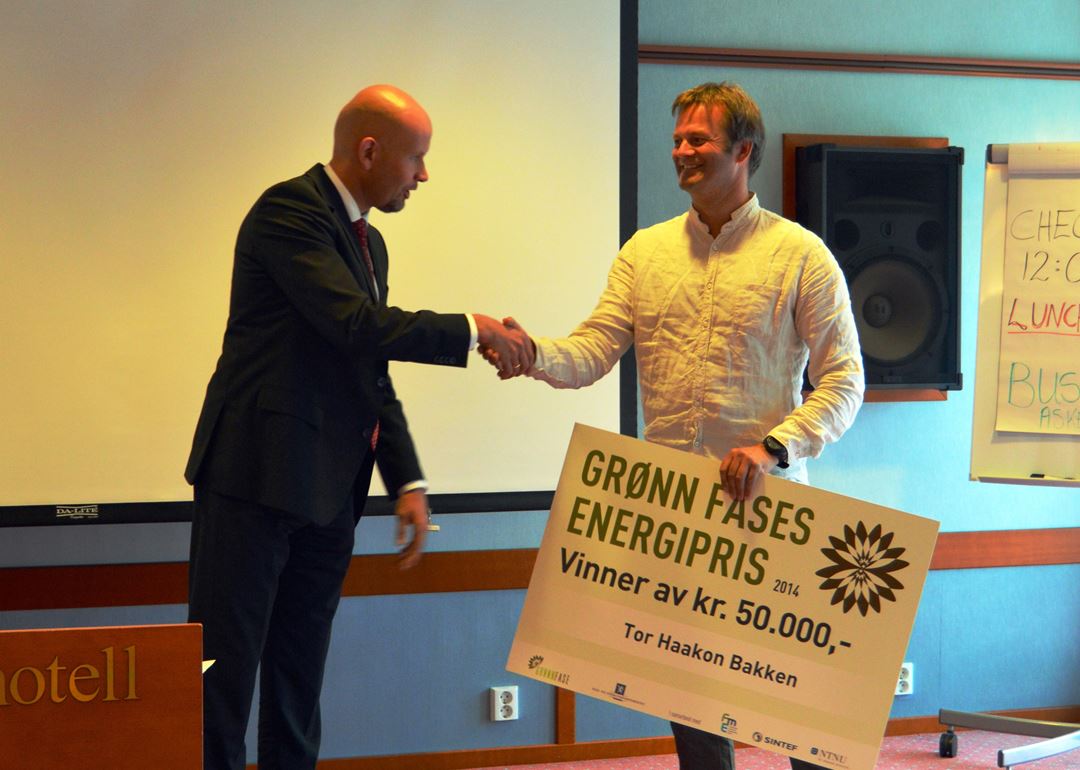Tord Lien, Minister of Petroleum and Energy, presented SINTEF researcher Tor Haakon Bakken with the energy award given by the think-tank Grønn Fase ('Green Phase') at an event in August.
The award was conceived by Green Phase, a think-tank made up of researchers working in the energy, climate and environmental sectors.
This was the third year that the forum invited people to take part in the competition for the 'best idea or concept to promote environmentally friendly energy in Norway'. The waiting ended today. The award was presented by none other than the Minister of Petroleum and Energy – and went to Tor Haakon Bakken, a researcher at SINTEF Energy.
The award-winner wants to utilise the energy in all the hot water that you and I pour straight into the sewage system. His idea is based on capturing the heat in waste water before it has left the building, and using it to heat clean water, or even to heat the building itself.
Right under the sink
As far as Bakken knows, the only similar concept currently in use in Norway is heat recovery from water in municipal decontamination plants.
"But even there, the hot water is mixed with a lot of cold water in the sewage system. Extracting heat from further up in the pipework is much more effective. In other words, right under the sink, where you pour away your pasta water, and at the point where water from the dishwasher, washing machine and shower enter the system", says Bakken.
General observations
Specifically, his idea is to install a temperature sensor high up in any pipes that transport hot and cold waste water.
When the water temperature exceeds a specified limit, it is diverted into an internal pipe system, from where the heat is extracted. The heat can then be used to heat hot water boilers. Bakken believes that this can be achieved using a heat exchanger, or by direct contact between hot and cold surfaces, or by a number of similar systems.
"The idea is based on general observations I have made, and I am certain that I cannot be the first person to have thought of this", says Bakken modestly. He normally works on other aspects of water as a resource. His specialist field at SINTEF Energy focuses on the environmental effects of hydropower.
He is now working on this subject as a Doctoral Research Fellow at the Norwegian University of Science and Technology's (NTNU) Institute of Water and Environmental Technology and CEDREN – one of Norway's 11 national research centres for eco-friendly energy.
A quarter of energy consumption
In the concept outline he submitted to the think-tank, Bakken refers to estimates from the Norwegian Water Resources and Energy Directorate (NVE) and Statistics Norway, which indicate that between 10 and 20 per cent of energy consumption in a standard household goes on heating water in boilers.
"We also use energy to heat water in washing machines, dishwashers and for food preparation. This means that the total energy used to heat water in a standard household could account for about 25 per cent of the same household's total energy consumption.
Globally, the proportion is even higher. I believe that heat recovery from hot water could be the next big energy efficiency measure to be applied in Norwegian homes", says Bakken.
Still some detective work to do
He thinks that the next step should be to find out whether any of these systems are already in use.
"There may be technical reasons why no one else has done it, or it could be because there are no suppliers.
It might not even be financially viable with today's technology and limitations. If that is the case, then it might be worth subsidising the systems. Norway uses green certificates to subsidise renewable energy production. I don't see that it is any less sensible to subsidise measures that reduce the need for new sources of energy supply", says Bakken.
By Svein Tønseth

